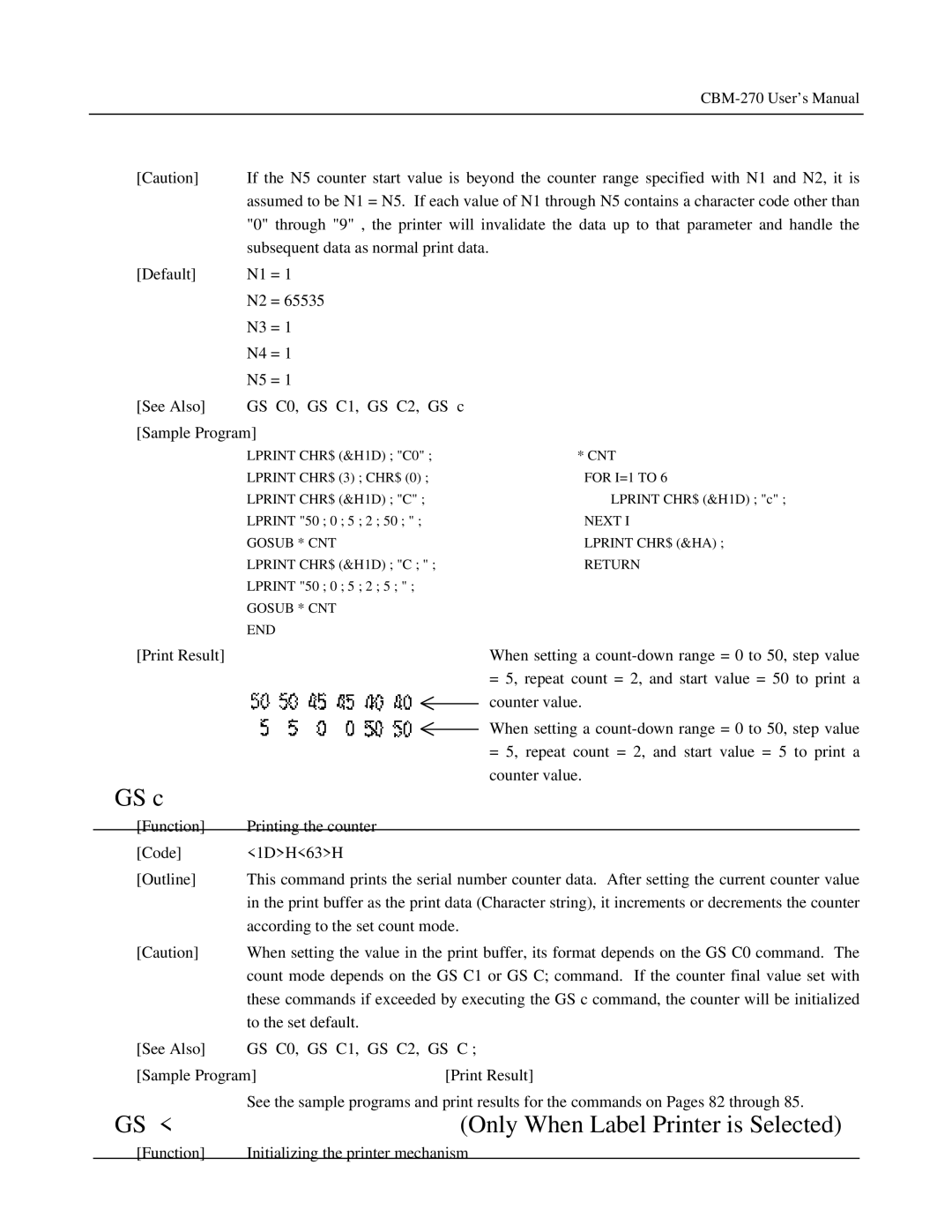
CBM-270 User’s Manual
[Caution] | If the N5 counter start value is beyond the counter range specified with N1 and N2, it is | |||
| assumed to be N1 = N5. If each value of N1 through N5 contains a character code other than | |||
| "0" through "9" , the printer will invalidate the data up to that parameter and handle the | |||
| subsequent data as normal print data. | |||
[Default] | N1 = 1 |
|
| |
| N2 = 65535 |
|
| |
| N3 = 1 |
|
| |
| N4 = 1 |
|
| |
| N5 = 1 |
|
| |
[See Also] | GS C0, GS C1, GS C2, GS c | |||
[Sample Program] |
|
| ||
| LPRINT CHR$ (&H1D) ; "C0" ; |
| * CNT | |
| LPRINT CHR$ (3) ; CHR$ (0) ; |
| FOR I=1 TO 6 | |
| LPRINT CHR$ (&H1D) ; "C" ; |
| LPRINT CHR$ (&H1D) ; "c" ; | |
| LPRINT "50 ; 0 ; 5 ; 2 ; 50 ; " ; |
| NEXT I | |
| GOSUB * CNT |
| LPRINT CHR$ (&HA) ; | |
| LPRINT CHR$ (&H1D) ; "C ; " ; |
| RETURN | |
| LPRINT "50 ; 0 ; 5 ; 2 ; 5 ; " ; |
|
| |
| GOSUB * CNT |
|
| |
| END |
|
| |
[Print Result] |
|
|
| When setting a |
|
|
|
| = 5, repeat count = 2, and start value = 50 to print a |
|
|
|
| counter value. |
|
|
|
| |
|
|
|
| When setting a |
|
|
|
| |
|
|
|
| = 5, repeat count = 2, and start value = 5 to print a |
GS c |
|
|
| counter value. |
|
|
|
| |
[Function] | Printing the counter |
|
| |
[Code] | <1D>H<63>H |
|
| |
[Outline] | This command prints the serial number counter data. After setting the current counter value | |||
| in the print buffer as the print data (Character string), it increments or decrements the counter | |||
| according to the set count mode. | |||
[Caution] | When setting the value in the print buffer, its format depends on the GS C0 command. The | |||
| count mode depends on the GS C1 or GS C; command. If the counter final value set with | |||
| these commands if exceeded by executing the GS c command, the counter will be initialized | |||
| to the set default. |
|
| |
[See Also] | GS C0, GS C1, GS C2, GS C ; | |||
[Sample Program] | [Print Result] | |||
| See the sample programs and print results for the commands on Pages 82 through 85. | |||
GS < |
|
| (Only When Label Printer is Selected) | |
[Function] | Initializing the printer mechanism |
